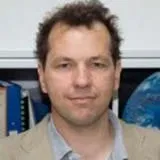Our team at King’s is one of the premier groups worldwide doing this kind of work, and we have every expectation that with this new capability from the MTG satellite, we can help deliver a step change in the use of satellites – and provide real-time information on fires burning across Europe and the UK.
Professor Martin Wooster, Professor of Earth Observation Science
14 August 2023
Faster satellite detection of extreme wildfires imminent
New satellite technology, modified by King’s researchers, is set to spot fires significantly earlier then currently possible – potentially enabling quicker suppression efforts.

Experts from the European FirEUrisk project have called for empowering populations through education on fire prevention and timely decision-making to save lives during extreme wildfires. However, a new satellite being modified by King’s researchers is set to automate the detection process, potentially detecting fires before the public.
Due to the high population density of Europe, most fires are called in by the public before satellites can spot them. The new European Meteosat Third Generation (MTG) satellite, however, provides updated imagery over Europe every 10 minutes and at a level of spatial detail that was previously only available a few times a day.
This capacity may allow new fires to be spotted significantly earlier than is currently the case, perhaps even earlier than the public. King’s is also working on ways to make this process even faster, to the point where automatic detection is possible.
The researchers are also working on ways to estimate, from these data, how much smoke is being emitted into the atmosphere as a result of the detected fires. This would enable more accurate warnings of poor air quality – prior to fires becoming so intense that suppression methods have limited effectiveness.
King’s is one of the partners working on the FirEUrisk project, which connects with authorities at the local, national, and European scale, to improve decision-making and also to help inform the public, through scientific research and specific tools to evaluate fire risk.
In addition to building tools for strategic decisions on fire behaviour, the project is now encouraging citizen involvement when it comes to saving lives during wildfires. This is because wildfires are becoming ever more extreme – to the point where firefights and firefighting resources are no longer enough.
We now face more fires in spring, in March and April, and the season is also extending to late summer, even autumn, with fires burning through late September, October and sometimes even in November.
Dr Domingos Xavier Viegas, FirEUrisk coordinator
In such a volatile situation, conditions may change suddenly, complicating suppression work. To save lives, the project urges that populations need to be ready and know how to respond.

